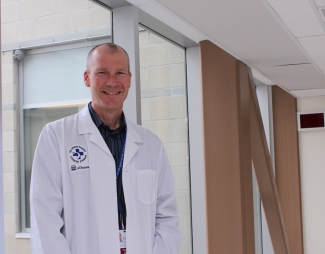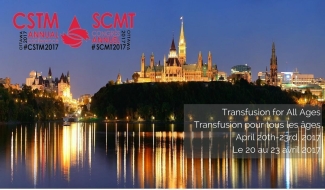Kudos to our research colleagues at The Ottawa Hospital on receiving 18 new CIHR research grants worth $10.7 million.
“Eighteen research groups at The Ottawa Hospital, affiliated with the University of Ottawa, have been awarded nearly $11 million in the most recent project grant competition from the Canadian Institutes of Health Research (CIHR).”
Congratulations to all with a special shout out to those affiliated with our Centre for Innovation conducting research in key focus areas relevant to transfusion, cellular therapies and donation and transplantation medicine. We’re especially excited to have the pleasure of being involved in many of these exciting projects. For example:
Blood transfusions: is male donor blood better for recipients than female donor blood? (summary)
- Principal Investigators: Dean Fergusson, Michaël Chassé, Alan Tinmouth
- Co-Investigators: Jason Acker, Shane English, Alan Forster, Nadine Shehata, Kednapa Thavorn, Kumanan Wilson
From the project summary: “Transfusion of red blood cells is a necessary lifesaving intervention but is also associated with adverse events... The trial will help determine how we can tailor the selection of blood donors based on donor characteristics (e.g. sex) to further improve the safety and optimize the clinical benefit of blood products in Canada. We will also develop innovative and efficient infrastructure and capacity to conduct further transfusion trials and advance the practice of transfusion."
Interestingly, this work stems from previous studies – what we called hypothesis-generating work - that dug into data and uncovered some curious associations that needed more investigation. Co-investigators from Canadian Blood Services include Dr. Jason Acker, senior development scientist, and Dr. Nadine Shehata, medical officer.
Recent findings from Sweden and Denmark (Scandinavian Donations and Transfusions database) make the results of this forthcoming project of keen interest. It’s also been noted that though big data studies offer a treasure trove from which researchers can glean key information and research direction, caution must be taken. Understanding the effect of donor characteristics, blood processing methods, storage solutions, and duration of blood product storage on the quality of the product is a focus for researchers and blood operators around the world. Moving from hypothesis to evidence is a key step in the scientific process.
Another project of interest, one finding its way through the clinical trial journey, was featured on this blog last year.
Septic shock: evaluating mesenchymal stem cell therapy (Summary)
- Principal Investigators: Lauralyn McIntyre, Dean Fergusson
- Co-Investigators: Duncan Stewart, Shirley Mei, David Courtman, Claudia Dos Santos, Shane English, Alison Fox-Robichaud, John Granton, Robert Green, Paul Hébert, Margaret Herridge, John Marshall, Sangeeta Mehta, Timothy Ramsay, Kednapa Thavorn, Alexis Turgeon, Keith Walley, Brent Winston
Principal investigator Dr. Lauralyn McIntyre was a recipient of a New Investigator Award from a Canadian Blood Services / Canadian Institute for Health Research partnership for 2008–2013. Today, Dr. McIntyre is also an adjunct scientist with Canadian Blood Services' Centre for Innovation. This newly funded project is the next important step – CISS trial phase II – and continues to study the safety of this stem cell treatment and evaluate clinical and patient outcomes.
Brain bleeding: comparing blood transfusion strategies for aneurysmal subarachnoid hemorrhage (aSAH) ( Summary)
- Principal Investigator: Shane English
- Co-Investigators: Jason Acker, Almunder Algird, Eyad Althenayan, John Boyd, Martin Chapman, Michael Chasse, Leodante Da Costa, Frederick D'Aragon, Dariush Dowlatshahi, Dean Fergusson, Donald Griesdale, Andreas Kramer, Demitrios Kutsogiannis, Francois Lauzier, Cheemun Lum, Shawn Marshall, Lauralyn McIntyre, Giuseppe Pagliarello, Damon Scales, John Sinclair, Jeffrey Singh, Alan Tinmouth, Alexis Turgeon, Ryan Zarychanski
“With our SAHaRA pilot trial we have shown our ability to conduct such a trial. In the trial we propose here, we aim to prove that maintaining a higher hemoglobin (blood) level in the first 21 days following aSAH will result in less death and better outcomes 12 months after their aSAH. We will compare higher blood levels to the usual care of allowing blood levels to drop before considering transfusion. We will also assess the effect of these two treatment options several other outcomes.”
Working with Dr. English are Canadian Blood Services’ scientists Dr. Jason Acker and medical advisor, Dr. Alan Tinmouth, and adjunct scientist Dr. Lauralyn McIntyre. This new project builds on the SAHaRA pilot that was funded by a Canadian Blood Services/CIHR operating grant awarded in 2015.
In other funding news...
A quick shout out to Dr. Robert Ben, a University of Ottawa researcher who also received a CIHR grant in this recent round of hard-to-get funding for his project “Inhibiting Ice Recrystallization – A strategy to enable cellular therapies”.
We’re pleased to have supported Dr. Ben’s important and relevant research through a number of Centre for Innovation funding programs. Co-investigators on previous projects include Centre for Innovation scientists, Drs. Jason Acker, Nicolas Pineault and medical director Dr. David Allan. We congratulate Dr. Ben and his team in moving this research along and successfully being awarded funds by CIHR to continue this important work.
From the project abstract: “Cell-based therapeutics have emerged as a critical aspect of modern health care and have shaped new models of care in stem cell therapy, regenerative medicine and transfusion practices. Unfortunately, current cryopreservation protocols remain suboptimal and limit the effectiveness of hematopoietic stem cells (HSC) from human umbilical cord blood and red blood cells (RBCs). Improved cryopreservation methods that specifically inhibit ice recrystallization will increase the success of such therapies, dramatically improve outcomes for patients and ultimately improve storage and distribution of these cellular products.”
Increasing knowledge in the area of cryopreservation, cryostorage and re-crystallization of red blood cells and other blood products is of particular interest and relevance for Canadian Blood Services.
Stay tuned
In cooperation with CIHR, Canadian Blood Services has funded three additional transfusion-related projects that were part of the Fall 2016 Project Grant competition. Keep an eye on this space, a post later this week will feature these projects.
Canadian Blood Services – Driving world-class innovation
Through discovery, development and applied research, Canadian Blood Services drives world-class innovation in blood transfusion, cellular therapy and transplantation—bringing clarity and insight to an increasingly complex healthcare future. Our dedicated research team and extended network of partners engage in exploratory and applied research to create new knowledge, inform and enhance best practices, contribute to the development of new services and technologies, and build capacity through training and collaboration.
The opinions reflected in this post are those of the author and do not necessarily reflect the opinions of Canadian Blood Services nor do they reflect the views of Health Canada or any other funding agency.
Related blog posts
As medical director stem cells at Canadian Blood Services, a scientist in the Sprott Centre for Stem Cell Research at The Ottawa Hospital and associate professor at the University of Ottawa, Dr. David Allan possesses a wealth of knowledge about clinical practice and research directions in blood- and...
Last week, the 2017 Canadian Society for Transfusion Medicine Conference “Transfusion for All Ages” rolled into Ottawa. Each year, the CSTM presents this event in partnership with Canadian Blood Services and Héma-Québec.

